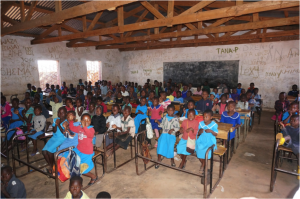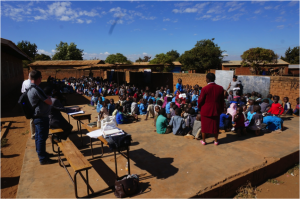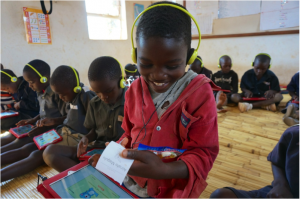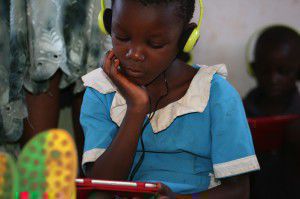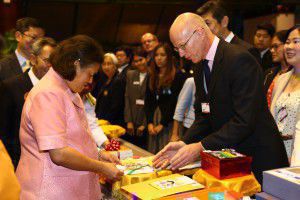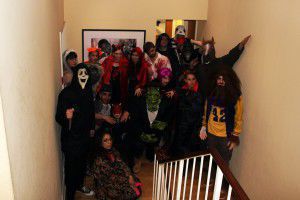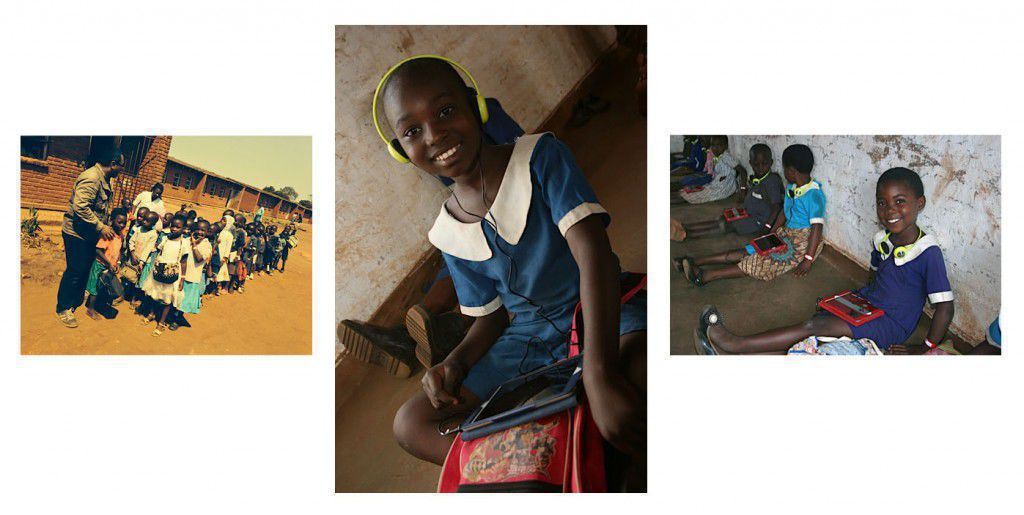An update from Malawi
As you may know, EuroTalk have been working for several years towards the goal of bringing the best possible education to one billion children in developing countries. This work is something we’re very passionate about, and so we’re excited to announce the birth of onebillion, a charitable organisation set up by Jamie and Andrew from EuroTalk to focus solely on making this vision a reality. EuroTalk are proud to support onebillion as they continue their vital work, and we’ll be bringing you regular updates and news on what they’ve been up to.
So for today’s post, it’s over to Alex for an update from Malawi:
Over here at onebillion, we’re working hard on producing the final six topics for Maths, age 4-6, writing and programming a practice app to accompany Maths, age 3-5 and planning a whole lot of new Learn to Read and Letters and Sounds material. We’re also making progress, slowly but surely, towards expanding our Masamu (maths) project throughout all 5,000 schools in Malawi!
So, what have we been up to in Malawi recently? Well, first and foremost, we’re in the process of looking for a second school in which to implement our Masamu intervention. This has been running successfully at Biwi school in Lilongwe for almost a year now and an independent study by the University of Nottingham has shown that using the apps for as little as eight weeks can drastically increase children’s level of maths knowledge. So Andrew and Jamie have spent a couple of days at Ngwenya school, also in Lilongwe, to assess its suitability as a second school for us to get working in. Ngwenya seems to be a well-organised school, and even has desks in its classrooms! However it is a huge school with 5,000 pupils in total – meaning it will pose some challenges in terms of scaling our current intervention.
Work is already under way to construct a new learning centre in the school, like the one we’ve been using at Biwi, where the children will have a dedicated space to come and work in, and there will be somewhere to store and charge the ipads.
Speaking of charging the devices, we’ve also been road-testing solar-powered charging to allow large quantities of iPads to be charged even in rural schools which may not have electricity. Biwi school has access to a power socket in the head teacher’s office, but this is restricted to just the one room, and even this is fairly uncommon in Malawian schools, so finding an alternative way to charge the devices was really important to us, and will continue to be as we look at scaling further afield in other parts of Africa.
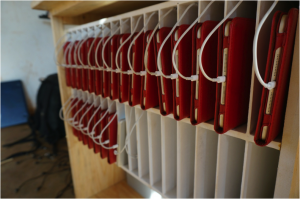
Our solar charging stations have been working great so far, and are simple for the teachers to use.
We’ve also just implemented our brand-new battery-powered, low-cost printers at Biwi. These allow the children to immediately print their certificates which they win as they complete each topic within the Masamu apps. These are printed on a cheap and durable receipt-style paper, which is a simple and low-cost way for the children to see the results of their hard work, and the teachers to keep records of their achievements. This will work hand in hand with our new server version of the apps, which was the main purpose of Jamie and Andrew’s visit. It allows us to receive data from schools in Malawi almost instantly, keeping us up-to-date on which children have completed which topics, and their results. Hopefully we’ll start to receive data from the server within the next week or so, and will be able to see the apps being used in real time.
So it’s onwards and upwards in the onebillion office, and we’re really excited to see results coming in from Biwi school and to get our Masamu apps into Ngwenya school. We’re also hoping to get some new topics ready in Chichewa within the next couple of months, which will extend the current Masamu 4-6 app from twelve to eighteen topics!
You can find onebillion at onebillion.org.uk, like us on Facebook or follow us on Twitter @1bnchildren for news, updates and pictures from Malawi.
Alex
EuroTalk: a look back at 2013
It’s been another busy year at EuroTalk, with new products, new languages… and a new puppy. Throw in a royal encounter and a cake that looks like a Dalek, and you’ve got the makings of an interesting twelve months.
Languages
In June, we launched our new app for iPhone and iPod touch, uTalk. This had been in development for a long time, and we were really proud and excited to be able to share it with the world. It’s got more content and more activities, and it’s free to download and start learning the essential words you need to get by in 60 languages. We’ve been adding more languages regularly since the app was launched, and will continue to do so over the coming months. So if we haven’t yet got the language you need, don’t worry – we soon will.
And that’s not all. Last month, we added Lao, the official language of Laos and also spoken in the north east of Thailand, to our range with the release of Talk Now, our beginner program for PC and Mac. Lao has about 15 million speakers worldwide, and is a language we’ve been wanting to offer for some time now. There are more new languages on the way in 2014, so watch this space…
Maths
This year also saw the launch of part 2 of our second maths app, Maths, age 4-6, and two new practice apps – Count to 10 and Count to 20. We also released a version of Maths age 3-5, for schools, so teachers can use the app in the classroom.
Malawi
We’ve been working in Malawi now for several years, as part of our mission to ensure one billion primary age children reach their full potential in numeracy, reading and English. This year, Dr Nicola Pitchford from the University of Nottingham conducted an evaluation at Biwi Primary School in Malawi, to measure how effective our maths apps are for the children’s learning, compared to other teaching methods, including other apps. The preliminary results show that not only did the group using our apps perform significantly better than the other groups, but in fact they tripled their maths knowledge in just eight weeks. This is really exciting and encouraging, and we hope now to scale up the project in Malawi to reach more children, in more schools.
Junior Language Challenge
2013 saw the return of the JLC, after a year off in 2012. Our annual language learning competition for primary age children across the UK is always very popular, and this year was no exception. We were joined at the final by Martha Payne of NeverSeconds, who at just 10 years old, has raised over £140,000 for Mary’s Meals, a charity providing school dinners to children in Malawi. Martha, with her dad and her sister, was our special guest and handed out the prizes to our finalists, including the JLC Champion for 2013, Ella Whittingham from West Bridgford, Nottingham.
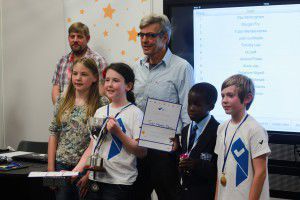
Martha Payne with JLC Champion Ella Whittingham, runners-up Morgan Fry and Tudor Mendel-Idowu, and EuroTalk Chairman Richard Howeson
A Royal Visit
In October, Steve was honoured by a visit from Her Royal Highness Princess Maha Chakri Sirindhorn of Thailand, while at an exhibition in Bangkok. The Princess came to have a look at the EuroTalk stand, and later Steve presented her with a gift on behalf of the company. He had to be instructed on the correct way to bow, and fortunately he got it right!
New arrivals
This year, we’ve said a sad goodbye to Glyn, Tom and Hanna, but welcomed Safia, Seb and Pablo. We’ve also been lucky to have Lorena with us from Germany for a few months; you may have enjoyed some of her blog posts! And in August we welcomed Molly the puppy, who caused a certain amount of mayhem, but was very easily forgiven because she’s so cute.
Fancy dress fun
We entered into the ‘spirit’ of Halloween by getting dressed up for the occasion. With everything from vampires to skeletons, pumpkins to werewolves, we were quite a sight to behold. Although some of us were scarier than others…
Lots of cake
We’ve always enjoyed a bit of cake here at EuroTalk, but this year we’ve been thoroughly spoilt, with keen bakers Safia and Alex (but mostly Safia) providing us with masterpieces like this amazing Dalek cake. (It took us three days to eat, but it was totally worth it.)
And so the year has come to an end in style. Thanks as always for reading our blog, and to our guest bloggers who’ve been in touch over the last year. Please do contact us if you have something you’d like to share!
Happy New Year, everyone – see you in 2014!
What language is spoken in France?
A quick quiz question for you: what language is spoken in France?
Answer: well, French of course! But did you know France is also home to several small regional languages, including Alsatian, Catalan, Breton and Occitan?
 Like many other European countries, the French once spoke a wide range of regional languages and dialects. However, during the Third Republic, the French government made French the only official language, and outlawed use of regional languages such as Breton and Occitan in schools and institutions. The underlying idea of creating national and linguistic unity may have been well-intentioned, but as a result, most of these regional languages are now endangered.
Like many other European countries, the French once spoke a wide range of regional languages and dialects. However, during the Third Republic, the French government made French the only official language, and outlawed use of regional languages such as Breton and Occitan in schools and institutions. The underlying idea of creating national and linguistic unity may have been well-intentioned, but as a result, most of these regional languages are now endangered.
Nowadays, Occitan is spoken by around 1.33% of the population (in the Occitania region in Southern France), whilst Breton is spoken in Brittany by around 0.61% of the population. These languages are recognised by the government, but not considered official languages, and therefore given minimal support and opportunity for use.
The situation is a little more encouraging in Spain, where Basque, Catalan, Valencian and Galician are recognised as co-official regional languages, and a thriving community of native speakers exists in each of these regions.
This rather cool map shows how the areas over which each of these languages is/was spoken has changed over the last 1,000 years.
Over time, due to globalisation, mass media and government drives for national unity, the national languages in Spain, France and many other countries have established dominance and pushed smaller regional languages onto the sidelines. However, there are still communities of native speakers of each of these languages, and many people are passionate about passing on the language and culture of their region to the next generation.
Regional languages are often closely tied to the culture and identity of a region: the Catalonians I know are proud Catalan speakers, and often much of an area’s history, literature, music and so on is written in the regional language. These languages may be small, but they are certainly worth learning and preserving!
In fact, we have produced our Maths, age 3-5 and 4-6 apps in both Basque and Catalan, and uTalk is currently available in Galician, Basque and Catalan. And for anyone interested in regional French languages, why not learn a few phrases for free in Occitan, Breton, Alsatian or Provencal?
Alex
A step closer to one billion children
If you’ve been on our Facebook or Twitter page recently, you may have noticed some of our photos from our recent trip to Malawi. Although some members of our office are convinced we went over there to buy beans for our new coffee machine, we were actually there to run an evaluation on the success of our maths apps in schools there. Myself, Jamie, Andrew and Nicola Pitchford from Nottingham University spent 10 days in Lilongwe, Malawi’s capital, testing around 400 Malawian kids at Biwi primary school on basic maths and motor skills, as well as asking them questions about their aspirations and how they feel about school life in general.
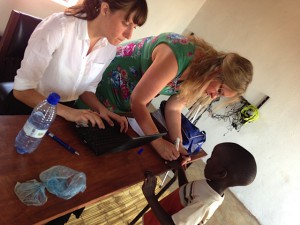 If you have never tried to register the names and details of hundreds of small children, and chase them all down to put the right coloured and named wristbands on each one, you might struggle to imagine the level of chaos that we experienced, with several kids coming back to try and get their photos taken twice, some losing or destroying their wristbands after just one day, and our complete inability to spell Malawian names!
If you have never tried to register the names and details of hundreds of small children, and chase them all down to put the right coloured and named wristbands on each one, you might struggle to imagine the level of chaos that we experienced, with several kids coming back to try and get their photos taken twice, some losing or destroying their wristbands after just one day, and our complete inability to spell Malawian names!
However, somehow we managed this massive task, and got down to business putting the children into groups (a red group, who will use our maths apps for 8 weeks, a blue group who will use other fun, but non-maths, apps, and a pink group who will carry on with teaching as usual). After this, we began to assess the children, running our specially-designed evaluation app on groups of around 50 children at a time.
Thanks to Nicola’s amazing organisational skills and hard work from everyone, we managed to assess all the children who are part of the study in just three days, albeit with our stress levels a little higher at the end of several hours of using our rather basic knowledge of Chichewa to explain to kids how to use their shiny new ipads (or ‘gadgets’ as they call them!). The red group will now have 8 weeks to use the Masamu (maths) apps for a few hours each week, and we will be back to assess their progress in November!
We all had an amazing time in this beautiful country, and it was fantastic to see the level of interest that there is in our project. I was particularly happy to see how far some of the children got with the assessment tasks, and how hard some of them concentrated on getting the right answers, and trying out a range of new tasks that they would never normally be asked to do. There is clearly a lot of natural maths talent there, so we’re extremely excited to see the progress that they make with the extra teaching and support we are giving them during the study.
Make sure you check out our Flickr account for loads of pictures of the goings-on at Biwi school!
Alex
Lost in translation: making sense of maths
Reading Nat’s post about all the fascinating linguistic differences and difficulties that she and her translators experienced when translating the new uTalk app, I was reminded of some of the similar issues we’ve had in localising the maths apps. What seems totally normal to a three-year-old in the UK might not be all that familiar to a kid in Malawi, for a start! Not to mention the fact that (unfortunately for us English speakers), not all languages follow our grammar rules. Here are a few of the cultural and language localisation issues we’ve come across recently…
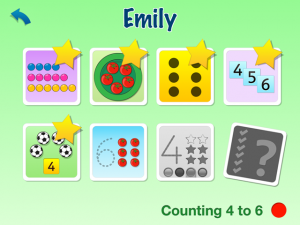 In Swedish, there were a couple of interesting language differences, for example: you cannot use the same word for ‘height’ in Swedish for an object such as a house as for a person (Välj det Längsta barnet – choose the tallest child, but Välj det högsta trädet – the tallest tree), whereas in English we can say short or tall regardless of the object.
In Swedish, there were a couple of interesting language differences, for example: you cannot use the same word for ‘height’ in Swedish for an object such as a house as for a person (Välj det Längsta barnet – choose the tallest child, but Välj det högsta trädet – the tallest tree), whereas in English we can say short or tall regardless of the object.
In Malawi, some of the ‘everyday’ objects featured in the apps probably seemed more than a little strange. In fact, Chichewa is strongly based on words for things that people see and encounter in daily life. Our translator had to get a bit creative and come up with ‘equivalent’ names for objects such as a robot (a doll in the Chichewa version), a turnip (a potato in the app), a dragon (she had to use a description meaning ‘a fierce animal’) or a fridge (replaced by a cupboard). There are also many more ‘technical’ words which don’t exist in traditional Chichewa, such as shapes. These are therefore normally given English names with a slight Chichewa accent (sikweya, trayango, rekitango and so on).
This is quite similar in Wolof: many items simply do not have a name in Wolof, or the words are unfamilar to most young people. Many items are therefore named in French instead, such as animals (giraffe), shapes (cercle) or fruits (banane). Above about 10, Wolof-speakers also tend to revert to French numbers instead of the more complex Wolof system (similar to the Chichewa – 5 and 1, 5 and 2…).
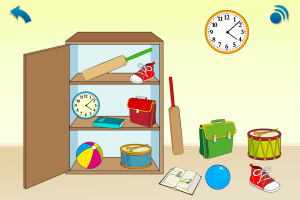 As with the uTalk app, Polish proved an especially problematic language for us too. One of the biggest issues was that in Polish the word for ‘you’ is dependent on gender. The translator mainly dealt with this by saying ‘we’ (e.g. Nauczyliśmy się/robiliśmy – we learned/were learning how to…), rather than addressing the child playing the app as male or female. It is also not usual to use prepositions such as ‘inside’ and ‘outside’ when describing the location of an object. e.g. instead of saying ‘the book is outside the cupboard’, Poles would normally say ‘the book is not in the cupboard’. Similarly to many other languages, some of the objects were also not very familiar: a cricket bat is not a well-known object, so it was translated as kijek – a little bat, and mangoes were translated as owoce – a fruit, as mangoes are not a ‘usual’ fruit in Poland – the same was the case with the Hungarian app, where we translated mango as gyumolc – also a generic word for fruit.
As with the uTalk app, Polish proved an especially problematic language for us too. One of the biggest issues was that in Polish the word for ‘you’ is dependent on gender. The translator mainly dealt with this by saying ‘we’ (e.g. Nauczyliśmy się/robiliśmy – we learned/were learning how to…), rather than addressing the child playing the app as male or female. It is also not usual to use prepositions such as ‘inside’ and ‘outside’ when describing the location of an object. e.g. instead of saying ‘the book is outside the cupboard’, Poles would normally say ‘the book is not in the cupboard’. Similarly to many other languages, some of the objects were also not very familiar: a cricket bat is not a well-known object, so it was translated as kijek – a little bat, and mangoes were translated as owoce – a fruit, as mangoes are not a ‘usual’ fruit in Poland – the same was the case with the Hungarian app, where we translated mango as gyumolc – also a generic word for fruit.
In Portuguese, there is no real way to distinguish between ‘more’ and ‘most’ or ‘less’ and ‘least’. Mais means both more and most, and menos less/least/fewer/fewest. This is also the case in Welsh: ‘bigger’ and ‘biggest’ translate to mwy and mwyaf respectively, but ‘more’ and ‘most’ also translate to mwy and mwyaf. The same goes for ‘smaller’/’smallest’ and ‘less’/’least’ (llai, lleiaf). On the other hand, there are different words for top and bottom shelves. Generally ‘top’ and ‘bottom’ are top and gwaelod but ‘top shelf’ and ‘bottom shelf’ are silff uchaf and silff usaf.
I was also intrigued to find out that in Amharic (an African language spoken in Ethiopia), they have a completely different system for telling the time: ‘1 o’clock’ does not mean lunch time, it in fact means ‘the first hour of the day’, i.e. when the sun comes up, and the rest of the day is counted from there. In fact, “Telling the time’ has been one of the hardest topics to localise, as our ideas of what happens at what time are not exactly international. Our French translator not only found the idea of eating a boiled egg for breakfast rather funny, but also pointed out that schools finish at 5 in France, not 3 as in the app, and a child would eat dinner at 7 or 8, not at 5 or 6! In Spain this is even funnier, as Spanish children regularly eat their dinner at 9 p.m., and go to sleep at 10 p.m. or perhaps later at the weekend or on holiday.
These are just a few of the language and cultural issues we’ve encountered on the maths translation project, and there are sure to be more! We have 10+ new languages ready to be released, and many more in the pipeline, so watch this space!
Alex
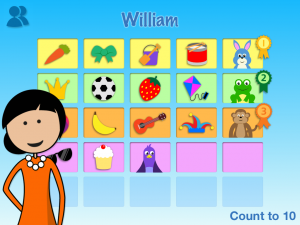 The maths apps are available from the App Store: Maths, age 3-5 and Maths, age 4-6.
The maths apps are available from the App Store: Maths, age 3-5 and Maths, age 4-6.
And also now available (in English only for the time being), Counting to 10, our first maths practice app, is on sale in the iTunes App Store for iPhone, iPod touch and iPad, and Google Play, for Android devices.
